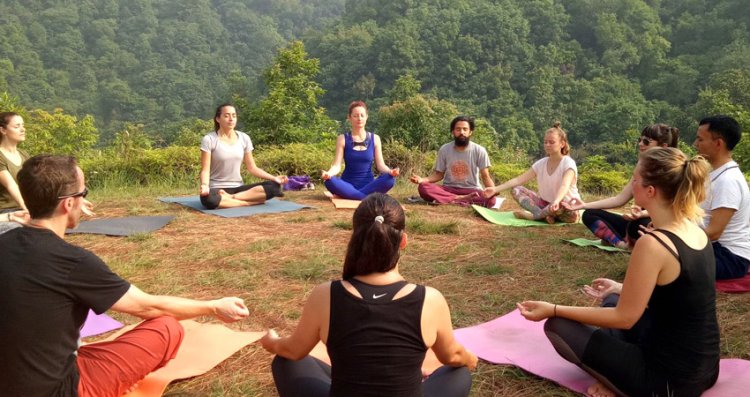Spiritual tourism in Nepal: Exploring the land of yoga and meditation
Discover the spiritual side of Nepal through spiritual tourism. Explore the land of yoga and meditation, and experience the ancient traditions of Hinduism and Buddhism that have been preserved for centuries.

Nepal has always been a popular destination for adventurous travelers seeking thrilling treks and cultural experiences. However, the country is also a haven for spiritual seekers who want to explore the deep-rooted yoga and meditation traditions. Nepal's serene and breathtaking landscape provides a perfect backdrop for spiritual journeys that heal the body and calm the mind. This article is a comprehensive guide to spiritual tourism in Nepal, including the subtopics:
The History of Yoga and Meditation in Nepal
Yoga and meditation have been an integral part of Nepalese life for centuries. The practice of yoga has been prevalent in Nepal for more than 5000 years. It is said that the great sage Patanjali, who wrote the Yoga Sutras, was born in Nepal. Similarly, meditation has been a part of the Buddhist tradition in Nepal for over 2500 years. The country's unique blend of Hinduism and Buddhism has resulted in the creation of many different styles of yoga and meditation practices. The history of yoga and meditation in Nepal is fascinating and inspiring, and the country has much to offer for those seeking to deepen their spiritual practice.
The Importance of Spiritual Tourism in Nepal
Spirituality is deeply ingrained in Nepalese culture and is an essential aspect of everyday life. For centuries, Nepal has been a hub for spiritual practices like yoga, meditation, and tantra. As a result, the country has become a center for those who seek spiritual growth and development. In recent years, spiritual tourism in Nepal has grown in popularity, attracting travelers from all over the world. Some of the key importance of Spirtual Tourism in Nepal are:
-
Cultural Significance:
Nepal has a long and rich history of spirituality and religion. The country is home to several important religious sites like Pashupatinath, Swayambhunath, Boudhanath, and Lumbini, which are deeply rooted in Nepali culture and traditions. By visiting these sites, spiritual tourists get to learn about Nepal's diverse cultural heritage and religious practices. -
Economic Benefits:
Spiritual tourism is a major source of revenue for Nepal. The industry provides employment opportunities for locals and generates income for businesses that offer services to tourists. The income generated from spiritual tourism helps to support the development of local infrastructure, including hotels, restaurants, and transportation facilities. -
Environmental Conservation:
Nepal is blessed with a diverse range of natural resources, including the Himalayas and several national parks. Spiritual tourism can help promote conservation efforts in these areas by raising awareness of their importance and supporting sustainable tourism practices. -
Personal Development:
For many spiritual tourists, visiting Nepal's spiritual sites is an opportunity for personal growth and self-discovery. The serene and peaceful environment of the religious sites can provide a sense of calmness and inspiration that helps visitors in their spiritual journey. -
Cross-Cultural Understanding:
Spiritual tourism promotes cross-cultural understanding and exchange. Tourists from different countries and cultures visit Nepal's spiritual sites, providing an opportunity for cultural exchange and understanding. This not only enriches the experience of the tourists but also helps to promote cultural harmony and understanding.
Top Yoga and Meditation Retreats in Nepal
Nepal has a vast array of yoga and meditation retreat centers that cater to the needs of both beginners and advanced practitioners. Many of these retreats are located in the Himalayan Mountains, providing a serene and awe-inspiring atmosphere for spiritual growth. Some of the best retreats in Nepal are:
-
Kathmandu Guest House Yoga and Meditation Center
Located in the heart of Kathmandu, this center offers a variety of yoga and meditation classes, workshops, and retreats, as well as accommodations for visitors.
-
Tushita Nepal Meditation Retreat
Situated in the hills of the Kathmandu Valley, this retreat center offers courses in Buddhist philosophy and meditation, as well as daily yoga and meditation classes.
-
Himalayan Yoga Academy
Located in the city of Pokhara, this academy offers a range of yoga classes and teacher training programs, as well as retreats and workshops focused on meditation and spiritual development.
-
Vipassana Meditation Center, Dhamma Shringa
This center is situated in the town of Lumbini, the birthplace of the Buddha, and offers courses in Vipassana meditation, as well as accommodations and meals for participants.
-
Kopan Monastery
Located in the hills above Kathmandu, this monastery offers meditation courses and retreats based on Tibetan Buddhist teachings, as well as accommodations for visitors.
Learning from Local Spiritual Teachers and Gurus
One of the most significant benefits of traveling to Nepal for spiritual tourism is the opportunity to learn from local spiritual teachers and gurus. Nepal has many spiritual masters who have dedicated their lives to teaching yoga, meditation, and other spiritual practices. Baba Hari Das, Yogi Narayana, and Swami Veda Bharati are some of the well-known spiritual gurus of Nepal. Some of the key benefits of learning from local spiritual teachers and gurus in Nepal are:
-
Authenticity:
Local spiritual teachers and gurus in Nepal have deep roots in the country's spiritual traditions and practices. They can offer an authentic and traditional perspective on spirituality that is grounded in the local culture and history. -
Cultural Exchange:
Learning from local spiritual teachers and gurus in Nepal provides an opportunity for cultural exchange. It is a chance to immerse oneself in the local culture and traditions, and gain a deeper understanding of the people and their way of life. -
Personal Growth:
Local spiritual teachers and gurus in Nepal can provide valuable guidance and support in one's personal growth and spiritual journey. They can offer insights and techniques that are unique to their traditions and experiences, which can help seekers to deepen their practice and expand their consciousness. -
Spiritual Practices:
Nepal is home to a wide range of spiritual practices and traditions, including Buddhism, Hinduism, Shamanism, and others. Learning from local spiritual teachers and gurus in Nepal can provide exposure to these practices and help seekers to explore and discover what resonates with them. -
Community:
Learning from local spiritual teachers and gurus in Nepal provides an opportunity to connect with a community of like-minded individuals who share a passion for spirituality and personal growth. This can help seekers to feel supported and inspired in their journey.
The Best Time to Visit Nepal for a Spiritual Journey
Nepal has a wide range of climatic conditions, with variations in temperature and rainfall throughout the year. The best time to visit Nepal for spiritual tourism is from October to December and from March to May. The weather is mild during these months, making it ideal for outdoor activities such as trekking and meditation. Additionally, the country has many festivals and celebrations during these months, providing a unique cultural experience for visitors.
The Benefits of Spiritual Tourism and How It Can Change Your Life
Spiritual tourism in Nepal can bring about significant changes in one's life. Some of the key benefits of spiritual tourism in individual life are:
-
Personal Growth:
Spiritual tourism provides an opportunity for personal growth and self-discovery. It allows travelers to step out of their comfort zone and explore new perspectives, beliefs, and practices. This can lead to greater self-awareness, personal transformation, and a deeper connection to oneself. -
Cultural Immersion:
Spiritual tourism allows travelers to immerse themselves in the local culture and traditions. It provides a unique opportunity to learn about the history and customs of a destination, and gain a greater appreciation for its people and way of life. -
Stress Relief:
Spiritual tourism can be a powerful tool for stress relief and relaxation. Visiting sacred sites and participating in spiritual practices can provide a sense of calm and inner peace, helping travelers to reduce stress and anxiety. -
Connection with Nature:
Many spiritual tourism destinations are located in natural and scenic locations. Connecting with nature can be a grounding and transformative experience, helping travelers to feel more connected to the world around them. -
Community Building:
Spiritual tourism can provide an opportunity to connect with like-minded individuals who share a passion for spirituality and personal growth. It can help travelers to feel supported, inspired, and part of a community. -
Enhanced Spiritual Practice:
Spiritual tourism can help to enhance one's spiritual practice by providing exposure to new traditions and practices, and deepening one's understanding of their own spiritual path.
The Philosophy and Teachings of Nepalese Spirituality
Nepalese spirituality is a unique blend of Hinduism and Buddhism, resulting in many different schools of thought and practices. Here are some key aspects of the philosophy and teachings of Nepalese spirituality:
-
Interconnectedness:
Nepalese spirituality teaches that all things are connected and interdependent. This includes humans, animals, plants, and the environment. The actions of one being can have an impact on others, and it is important to cultivate compassion and empathy for all living beings. -
Impermanence:
Nepalese spirituality recognizes that everything in life is impermanent and constantly changing. This includes our thoughts, emotions, and physical surroundings. Accepting the impermanence of life can help us to let go of attachment and find peace in the present moment. -
Inner Peace:
Nepalese spirituality places a strong emphasis on finding inner peace and contentment. This can be achieved through meditation, prayer, and other spiritual practices. By cultivating a sense of inner calm and stillness, we can learn to navigate the ups and downs of life with greater ease. -
Karma:
Nepalese spirituality recognizes the concept of karma, which is the idea that our actions have consequences that affect our present and future experiences. By practicing good deeds and cultivating positive intentions, we can create good karma and improve our future experiences. -
Dharma:
Nepalese spirituality places a strong emphasis on living in alignment with one's dharma, or life purpose. By living a life that is true to our values and passions, we can find greater fulfillment and meaning. -
Non-Dualism:
Nepalese spirituality recognizes the concept of non-dualism, which is the idea that all things are interconnected and part of a larger whole. This includes the concepts of good and evil, light and dark, and self and other. By embracing non-dualism, we can cultivate a greater sense of unity and interconnectedness with all things.
Overcoming Obstacles and Challenges on a Spiritual Journey
A spiritual journey is not always easy, and there may be obstacles and challenges to overcome. Some common challenges include physical limitations, cultural differences, and language barriers. However, these challenges can also provide opportunities for growth and learning. By overcoming these obstacles, one can develop greater resilience, empathy, and understanding. Nepalese spirituality provides many tools and practices that can help travelers overcome these challenges and achieve their spiritual goals.
In conclusion, spiritual tourism in Nepal offers a unique and transformative experience for those seeking spiritual growth and development. Nepal's rich spiritual culture, breathtaking landscape, and warm hospitality make it an ideal destination for spiritual tourism. Whether you are a seasoned practitioner or a beginner, Nepal has something to offer for everyone. By exploring the land of yoga and meditation, travelers can discover a deeper sense of purpose and meaning, and return home with a renewed sense of vitality and well-being.
What's Your Reaction?







































































































